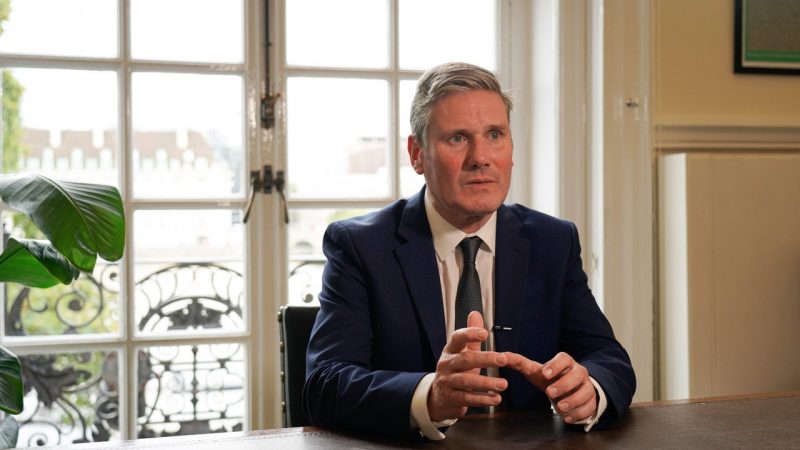
Keir Starmer has declared that he intends to “take suggestions” and continue discussions about his preferred rule changes for Labour conference – despite a lack of trade union backing for them at a key meeting today.
“Today’s TULO meeting was a welcome opportunity to set out some of the rule changes I believe will strengthen our party, our link with the unions and our ability to win the next election,” the Labour leader said.
“We had a positive conversation and I look forward to continuing those conversations through the coming days because the principles are important and we have to look at how we need to change to win again.
“I said yesterday this was never a take it or leave it conversation. I am continuing to take suggestions and have discussions about how we do everything we need to in order to make the Labour Party the party of working people again.”
TULO chair Mick Whelan and Labour issued a joint statement after the meeting, which read: “Keir Starmer and Labour’s affiliated trade union leaders had a positive meeting this afternoon to discuss the rule changes that the Labour leader would like to bring to conference in Brighton.
“There was broad consensus on the need to refocus the Labour party on the country and concerns of working people. Discussions will continue.”
LabourList has been told that Starmer is inclined to push on with his party reforms, including a return to an electoral college for leadership elections rather than one-member-one-vote, plus changes to the reselection system for MPs and to policy-making procedures.
Starmer may be advised to slim down his package of proposals, or abandon some rule changes altogether. It is understood that a final decision will be made once more discussions with stakeholders have been held.
At the meeting with union general secretaries today, the affiliates – including those typically supportive of the Labour leadership – expressed the view that there should be more consultation before the rule changes can be put to a vote. Unite the Union has suggested talks be held on the matter after conference.
Union sources have raised concerns over the costs and practicalities of bringing back the electoral college, particularly the rules around different types of political fund levy payers and what would happen to existing affiliate members who have been nurtured since Ed Miliband implemented the OMOV system.
Unite the Union has publicly opposed switching back to the electoral college system for leadership contests, which – unlike the current one-member-one-vote system – sees MPs, affiliates and members each given a third of the vote.
General secretary Sharon Graham emailed Labour MPs, saying that the electoral college plan was “unfair, undemocratic and a backwards step for our party”. She urged them to “publicly make clear that they do not support this proposal”.
TSSA general secretary Manuel Cortes has written to Starmer and general secretary David Evans expressing his opposition to the electoral college and saying that his union “will have no hesitation in voting against this gerrymandering”.
Labour MPs on the party’s left have publicly protested bringing back the electoral college and frontbencher Rachael Maskell has also spoken out against the measure. Soft left group Open Labour has urged conference delegates to vote against it.
John McDonnell said today: “If [Keir] wants to plough ahead, in all honesty he should go back to the people who elected him in the first place and say look this is what I didn’t tell you. This is what I want to do. And yes, that does mean a leadership election, why not? If he feels so strongly about this.”
It is understood that Starmer would like to see a policy-making process that can “bring our movement around a table to thrash out our positions on the challenges facing the country”, as opposed to “an endless series of motions at party conference”.
Under Jeremy Corbyn’s leadership, Labour increased the number of motions to be debated at conference to 20. LabourList understands that Starmer wants this number reduced – though discussions are ongoing about how much by.
In a piece for LabourList readers on Tuesday, Labour to Win co-founder, Labour First secretary and Labour NEC member Luke Akehurst wrote that “not all internal democratic conflict is electoral bad news”.
He added: “If it shows the leadership as confronting unpopular aspects of the party’s past, as with Hugh Gaitskell in 1960 and Neil Kinnock in 1985 and John Smith in 1993, an internal fight can strengthen a leader. If they lose but show the will to fight, their courage can inspire both the party and the electorate.”




More from LabourList
‘Labour won’t stop the far right by changing leaders — only by proving what the left can deliver’
‘Cutting Welsh university funding would be economic vandalism, not reform’
Sadiq Khan signals he will stand for a fourth term as London Mayor